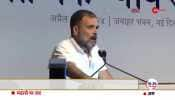Vienna: The head of the UN atomic agency
warned on Monday against complacency on nuclear safety six months
after the Fukushima disaster, as he admitted his draft global
"action plan" had been watered down.
"We must not lose our sense of urgency," International
Atomic Energy Agency (IAEA) head Yukiya Amano said at the
start of a regular five-day board meeting of the watchdog in
Vienna, according to the text of his remarks.
Just as he made his comments, French emergency services
said that there was a risk of radiation leaking after an
explosion in an oven at the Marcoule nuclear site near the
southern city of Nimes.
The gathering also saw Amano dismiss "greater
transparency" by Iran towards IAEA inspectors last month as
insufficient to soothe Western worries that Tehran is seeking
to develop nuclear weapons.
On March 11, a 9.0-magnitude quake rocked Japan`s
Fukushima Daiichi plant. The resulting 14-metre (46-foot)
ocean wave knocked out the power supply, the reactor cooling
systems and back-up diesel generators.
The resulting meltdown of reactors forced the evacuation
of tens of thousands of people and the banning of local farm
produce. Six months on, engineers are still fighting to stop
radiation leaking out.
The scale of the disaster, the worst since Chernobyl in
1986, sparked fresh worries worldwide about the safety of the
world`s 440 nuclear power stations in around 30 countries.
Europe`s biggest economy Germany, for example, decided to
shut down all reactors by 2022, while in June Italian voters
overwhelmingly approved a referendum blocking a return to
nuclear power.
Amano, who is Japanese, presented to the board a 12-point
"action plan" that he said "represents a significant step
forward in strengthening nuclear safety."
According to a draft seen by AFP, the 12-point plan
encourages fresh assessments of nuclear plants and of how well
countries are prepared for emergencies, as well as more "peer
reviews" of reactors by foreign experts.
For some diplomats, however, Amano`s proposals have been
watered down too much, most notably by Washington and Beijing,
by for example stopping short of making such visits mandatory.
Amano conceded as much, saying that in preparing the
proposals, the "wide range of views" expressed by IAEA member
states "varied in a number of areas" -- diplomatic speak for
serious differences of opinion.
He said that "firm and sustained commitment" was needed
from all countries for the full implementation of the action
plan, saying that public expectations were high.
"But it is actions, not words, that count," he said.
Bureau Report















